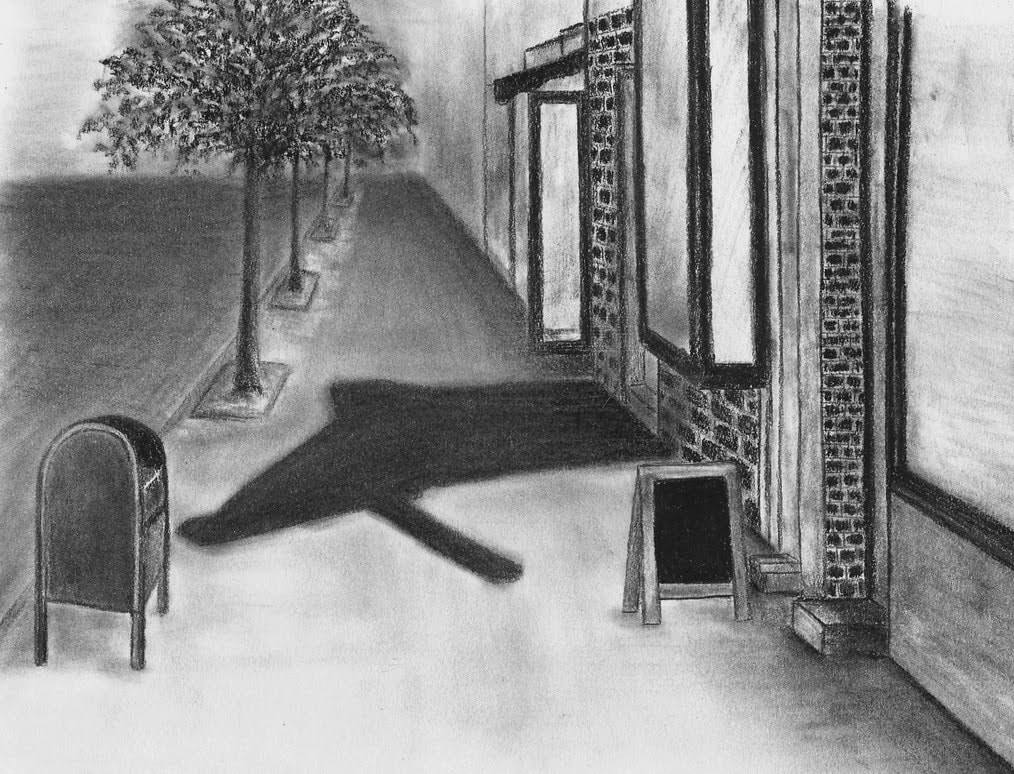Our story begins on a windy day. Leaves swoosh. Flags flutter. Paper cups pirouette.
And a large piece of musical furniture dangles precariously somewhere high overhead.
We don’t see it, but we feel it. We feel its presence as we move down the street. Its aura pressing down on us, condensing the atmosphere, casting a shadow that appears to be following us.
And we sense the inevitable. We sense our smiles will soon be flattened, our joy crushed momentarily.
We sense this because we’re experienced. Because we’ve heard this joke before, and we’ve been around this block enough times to know it is lousy with instruments. It is a lovely Sunday in the city and we’ve got our coffee and our papers and the wind setting our hairdos gaily aflutter, and then, suddenly, on the breeze we detect the faint mrrr of a rope overstretched, the light tinkle of keys, a vague scent of furniture polish.
Something is looming over us. And we know without even looking up—at neither sky nor story title—that it is a piano.
Of course, it is. And not just any piano, but THE piano, EL PIANO GRANDE, the one with your name on it, the one that will get you in good time.
We know it is coming. It must. It is the period at the end of this sentence. It is the third act, the punchline to this existential tragicomedy. When God closes a door, he opens a window—then proceeds to hang a large piano out of it. We know. We know. And we close our eyes and wait….
Bill Occasion, conversely, had no clue what was coming. He was not very musical. He stepped out of his apartment building, paused on the stoop, narrowly snatched his hat as it sailed off his head, and greeted the gust with hope and optimism.
For him, the air was charged with excitement, the possibility of adventure. Momentous things happen on windy days.
Skirts fly up! Armies are toppled. Cradles rock ominously in the treetops of our sweetest lullabies. Someone must catch the babies. It’s an opportunity to be heroic, to make an impression. Bill desired such things. As far as he was concerned, it was a fantastic windy day, and there was music in the air.
So he proceeded on his blithe promenade, necktie flapping, trousers rippling, whistling a tune that is vaguely familiar. It is an old song from the deep past, but for Bill, it is brand-new. He is making it up as he goes along. We brush past him on the sidewalk, and cast him a wary glance—a look that says, “watch out!” Bill nods, oblivious. He continues to whistle into the wind, to blow with and against it. His sport coat billowed as though he might take flight.
Shortly thereafter we hear a thundering crash from behind. Poor Bill, we think, but honestly, we’re relieved it wasn’t us. Not this time anyway. Not yet.
We look back for Bill and discover--
We discover that the wind has pushed over a mailbox which evidently had been full of letters. The letters spill out and spread across the pavement of the page. Words are constructed. Then sentences, narrative, this very story.
We pause to reflect on the pattern drawn from the chaos, momentarily forgetting (shrugging off?) the risk. And as we do, the giant shadow which overlays us grows rapidly deeper and wider.
CUE:
###
And a large piece of musical furniture dangles precariously somewhere high overhead.
We don’t see it, but we feel it. We feel its presence as we move down the street. Its aura pressing down on us, condensing the atmosphere, casting a shadow that appears to be following us.
And we sense the inevitable. We sense our smiles will soon be flattened, our joy crushed momentarily.
We sense this because we’re experienced. Because we’ve heard this joke before, and we’ve been around this block enough times to know it is lousy with instruments. It is a lovely Sunday in the city and we’ve got our coffee and our papers and the wind setting our hairdos gaily aflutter, and then, suddenly, on the breeze we detect the faint mrrr of a rope overstretched, the light tinkle of keys, a vague scent of furniture polish.
Something is looming over us. And we know without even looking up—at neither sky nor story title—that it is a piano.
Of course, it is. And not just any piano, but THE piano, EL PIANO GRANDE, the one with your name on it, the one that will get you in good time.
We know it is coming. It must. It is the period at the end of this sentence. It is the third act, the punchline to this existential tragicomedy. When God closes a door, he opens a window—then proceeds to hang a large piano out of it. We know. We know. And we close our eyes and wait….
Bill Occasion, conversely, had no clue what was coming. He was not very musical. He stepped out of his apartment building, paused on the stoop, narrowly snatched his hat as it sailed off his head, and greeted the gust with hope and optimism.
For him, the air was charged with excitement, the possibility of adventure. Momentous things happen on windy days.
Skirts fly up! Armies are toppled. Cradles rock ominously in the treetops of our sweetest lullabies. Someone must catch the babies. It’s an opportunity to be heroic, to make an impression. Bill desired such things. As far as he was concerned, it was a fantastic windy day, and there was music in the air.
So he proceeded on his blithe promenade, necktie flapping, trousers rippling, whistling a tune that is vaguely familiar. It is an old song from the deep past, but for Bill, it is brand-new. He is making it up as he goes along. We brush past him on the sidewalk, and cast him a wary glance—a look that says, “watch out!” Bill nods, oblivious. He continues to whistle into the wind, to blow with and against it. His sport coat billowed as though he might take flight.
Shortly thereafter we hear a thundering crash from behind. Poor Bill, we think, but honestly, we’re relieved it wasn’t us. Not this time anyway. Not yet.
We look back for Bill and discover--
We discover that the wind has pushed over a mailbox which evidently had been full of letters. The letters spill out and spread across the pavement of the page. Words are constructed. Then sentences, narrative, this very story.
We pause to reflect on the pattern drawn from the chaos, momentarily forgetting (shrugging off?) the risk. And as we do, the giant shadow which overlays us grows rapidly deeper and wider.
CUE:
###
D.C. Weaver was born in West Texas and now lives in Oregon. On the way from point T to point O, he has been such things as a radio news anchor, a bellhop at a New York City hotel, a door-to-door vacuum cleaner salesman, and an ejection seat mechanic for the U-2 spy plane. He holds a Ph.D. in English and teaches college writing and literature throughout the Willamette Valley.

